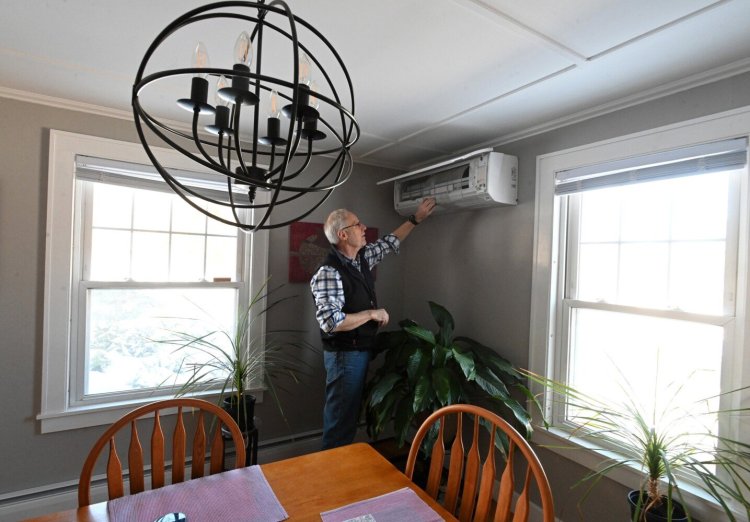WATERVILLE — With electricity rates jumping up by as much as 88% for many customers, largely due to the price increase of natural gas, a Waterville man has taken steps to insulate himself from spikes in energy costs, easing the burden on his wallet.
Steve Kahl, a professor at Thomas College and host of the “Power for the People” show on WERU Community Radio, has gradually made his home more energy-efficient over the last six years, including by signing up last August for a community solar farm to lock in his electricity rates. The move completed his transition to 100% renewable energy.
“For people who are concerned about climate change, saving money and saving oil, and in my case being 100% fossil (fuel)-free in this home, this is a win-win for my budget and for the climate,” Kahl said.
He has installed energy-efficient LED bulbs, a more efficient refrigerator, insulation in his basement and elsewhere, two heat pumps and a hybrid hot water heater that uses heat pump technology.
After receiving $5,600 in rebates from Efficiency Maine, an independent agency with oversight by the Maine Public Utilities Commission, Kahl paid about $10,250 out-of-pocket to install his heat pumps, insulation and hybrid hot water heater.
The heat pumps cost $5,000 after a $1,500 rebate. Low-income residents can access an even higher rebate from Efficiency Maine.
He estimates he has saved about $13,000 in electricity costs since converting to more energy-efficient equipment in 2016.
“It pays for itself in the first year-and-a-half,” Kahl said of the heat pumps.
Kahl’s efforts seem prescient in light of the decision by the Maine Public Utilities Commission in November to accept bids that will increase electricity supply rates to most customers in Central Maine Power Co.’s service area by 83%, and by 88% for Versant power customers. The new rates took effect Jan. 1 and will remain in place for one year.

Steve Kahl stands near the expanding foam insulation he had installed in the attic crawl space of his Waterville home. He also installed insulation on the walls of his basement. The insulation has helped increase the overall energy efficiency of his home. Kahl also uses heat pumps and is enrolled in a community solar program. Rich Abrahamson/Morning Sentinel
When it comes to overall heating costs, Kahl said the low-hanging fruit for homeowners is installing heat pumps to reduce reliance on comparatively expensive heating oil and signing up for community solar, which costs nothing and requires no long-term commitment to save on electricity.
The previous owner of Kahl’s house spent about $3,200 a year on heating oil. Kahl no longer uses heating oil and has a wood stove for backup or extra heat on especially cold nights.
“It does sound too good to be true, but it’s real,” he said.
Most community solar companies promise a 10%-15% reduction in electricity costs. Kahl said he is saving 10% because solar power is generally cheaper than electricity produced from natural gas.
A 2019 law expanded access to community solar projects by removing a nine-person limit for sign-ups and set off a wave of new installations in the state.
Maine utilities must buy and sell 80% of their power from renewable sources by 2030, and the state aims to become carbon-neutral by 2045.
Kahl facilitated the installation of a solar array at WERU, is helping with a carbon-neutral plan for a lodge at Quarry Road Trails in Waterville and was recently asked to join the greenhouse gas reduction committee at the Alfond Youth Center in Waterville.
There are two ways someone can sign up for community solar, one in which shares in a specific number of panels are purchased up-front and provide more long-term savings, and another that requires no investment or long-term commitment, according to Phil Coupe, of Montville-based ReVision Energy.
“Anybody can do subscription solar,” Coupe said.
ReVision has been in business since 2003 and installed at least 20 community solar farms, with between five and 10 more in development, he said.
Several companies in Maine offer sign-ups for community solar and even someone renting an apartment can sign up to save on electricity. An online search can connect a person with a community solar farm.
“We’ve seen an enormous increase in the construction of community solar farms, pretty much all over the state, as well as a rapid move to these community solar farms by consumers,” Coupe said.
The Governor’s Energy Office estimates that about 4,000 people are enrolled in a community solar farm, with more people signed up and waiting for other such farms to become operational.
Many projects under consideration are being delayed and may never come online due to issues in connecting to the electric grid, so potential community solar customers should inquire when electricity will start to be generated from an installation before signing up.
Send questions/comments to the editors.



Success. Please wait for the page to reload. If the page does not reload within 5 seconds, please refresh the page.
Enter your email and password to access comments.
Hi, to comment on stories you must . This profile is in addition to your subscription and website login.
Already have a commenting profile? .
Invalid username/password.
Please check your email to confirm and complete your registration.
Only subscribers are eligible to post comments. Please subscribe or login first for digital access. Here’s why.
Use the form below to reset your password. When you've submitted your account email, we will send an email with a reset code.